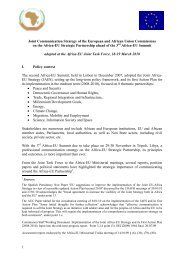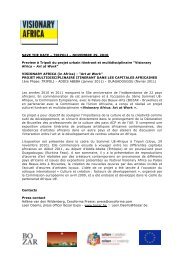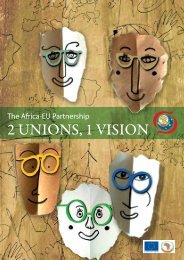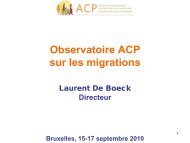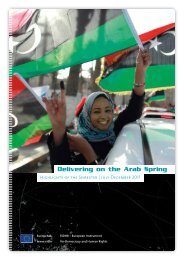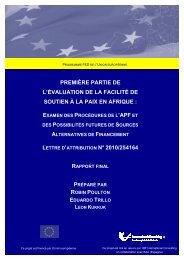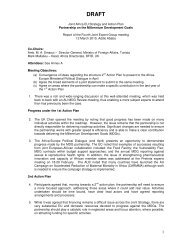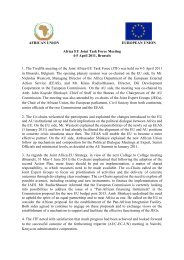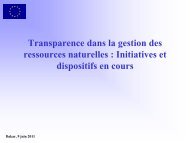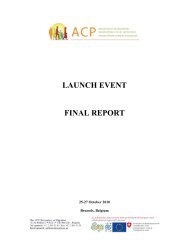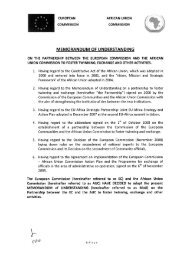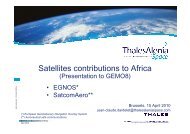part 1 of the african peace facility evaluation - European ...
part 1 of the african peace facility evaluation - European ...
part 1 of the african peace facility evaluation - European ...
Create successful ePaper yourself
Turn your PDF publications into a flip-book with our unique Google optimized e-Paper software.
APF MANAGEMENT AND ACCOUNTING<br />
In 2005, when APF started, it was assessed that AU/RECs met <strong>the</strong> four-pillar requirement to sign<br />
contribution agreements with <strong>the</strong> Commission. Later audits, on AMIS and MICOPAX first mission,<br />
disclosed a serious lack <strong>of</strong> sound management in both operations. As a solution, DEVCO Director<br />
General and AUC Deputy Chairperson reached an agreement in August 2009 on measures to<br />
streng<strong>the</strong>n AUC financial management, including precautionary measure to ensure tighter financial<br />
control over expenditures to keep on funding AMISOM. In <strong>the</strong> case <strong>of</strong> MICOPAX, even before ECCAS<br />
has undergone such an institutional assessments, <strong>the</strong> French military accepted to assume financial<br />
management <strong>of</strong> <strong>the</strong> operation through a special body in <strong>the</strong> field (CAF), and APF funding started to<br />
come through a Grant Agreement. Currently, an institutional assessment <strong>of</strong> AU is still going on and its<br />
<strong>of</strong>ficial results have not yet been made public. In 2011, ECCAS will also undergo an institutional<br />
assessment <strong>of</strong> its standards in accounting, audit, control and procurement procedures.<br />
To <strong>the</strong> Commission, it is clear that <strong>the</strong> African organisations should comply with <strong>the</strong> minimum<br />
conditions for implementing contribution agreements, as <strong>the</strong>y are bound to <strong>the</strong> financing regulations <strong>of</strong><br />
<strong>the</strong> EDF and good international practices. According to DEVCO, over <strong>the</strong> past few years, <strong>the</strong><br />
discussion on how to address <strong>the</strong> transition - <strong>the</strong> necessary time for <strong>the</strong> AUC to pass a positive 4-pillar<br />
review, foreseen for 2011 – was that, as a general rule, no new contribution agreement in joint<br />
management could be signed, except for AMISOM (currently IV and V) and, possibly, <strong>the</strong> APSA<br />
support (€40m, currently in <strong>the</strong> decision-making circuit). For AMISOM this is justified by <strong>the</strong> fact that<br />
<strong>the</strong> AUC accepted to incorporate into <strong>the</strong> contribution agreement, precautionary measures from <strong>the</strong><br />
aide-memoire on measures to streng<strong>the</strong>n AUC financial management + on <strong>the</strong> basis <strong>of</strong> a financial<br />
management risk analysis conducted by DEVCO and approved by <strong>the</strong> Director General (based on<br />
constant financial monitoring and positive audit results). In this sense, it should be noted that AMISOM<br />
V clearly states that: "<strong>the</strong> management system set up by <strong>the</strong> African Union Commission (AUC) for <strong>the</strong><br />
management <strong>of</strong> EU funds does not fully comply at <strong>the</strong> moment with all <strong>the</strong> conditions set out in Article<br />
29 <strong>of</strong> <strong>the</strong> Financial Regulation applicable to <strong>the</strong> 10th EDF. The Commission considers however that a<br />
contribution agreement in joint management may still be established under <strong>the</strong> strict conditions agreed<br />
in <strong>the</strong> joint <strong>European</strong> Commission/African Union Commission Aide-Memoire to streng<strong>the</strong>n AU financial<br />
management signed on 27 August 2009 and its revisions. These conditions were integrated in <strong>the</strong><br />
contribution agreement".<br />
III.1.4<br />
APPRECIATION OF APF DECISION-MAKING AND TIMING<br />
APF decisions do not take longer than any o<strong>the</strong>r EC EDF decisions, although <strong>the</strong> current APF<br />
decision-making procedures are quite lengthy. At best, it takes around two months to obtain an EC<br />
decision (AMISOM IV). These procedures are not well adapted to <strong>the</strong> needs <strong>of</strong> AUC/RECs’ support<br />
for maintaining <strong>peace</strong> and security in Africa. In <strong>peace</strong> operations, decisions <strong>of</strong>ten need to be fast and<br />
effective both from <strong>the</strong> managerial and financial perspectives; lives may be in danger, many risks are<br />
at stake. Never<strong>the</strong>less, APF decision-making procedures are not an exception within <strong>the</strong> EC legal<br />
framework. O<strong>the</strong>r EC financial instruments also have to go through <strong>the</strong> same general procedures,<br />
despite <strong>the</strong>ir possible urgency: except for <strong>the</strong> ECHO and IfS procedures, discussed below.<br />
IMPORTANCE OF STAFF COMMITMENT<br />
Never<strong>the</strong>less, as APF actions are <strong>of</strong>ten urgent and because so many visas are required for a decision<br />
to be adopted, DEVCO <strong>of</strong>ficials have to maintain a very active, informal, personal approach to <strong>the</strong>ir<br />
relations with o<strong>the</strong>r units, at every stage <strong>of</strong> <strong>the</strong> procedure, in order for <strong>the</strong>ir funding requests to<br />
proceed rapidly through <strong>the</strong> EC bureaucracy. This permanent, personal approach is demanding as<br />
well as time consuming and may not be sustainable. The fact is that <strong>the</strong> success <strong>of</strong> APF depends on<br />
<strong>the</strong> current hard working C6 and C5 staff, committed to <strong>the</strong> ideals <strong>of</strong> African <strong>peace</strong> and personally<br />
Page 27 <strong>of</strong> 49




